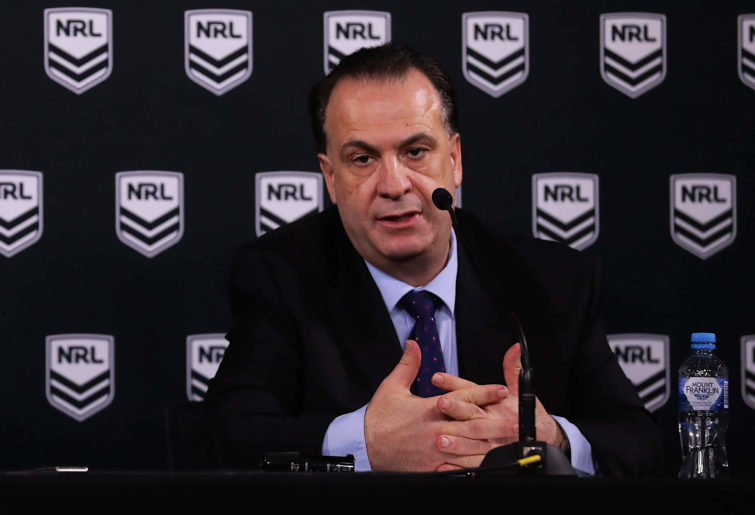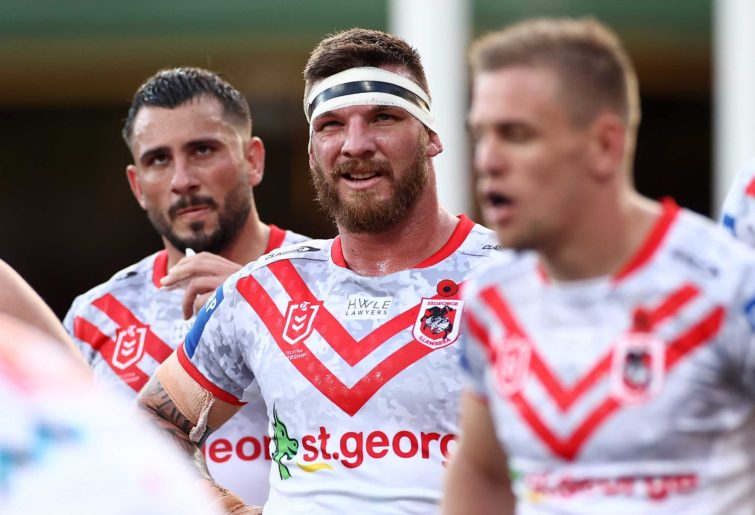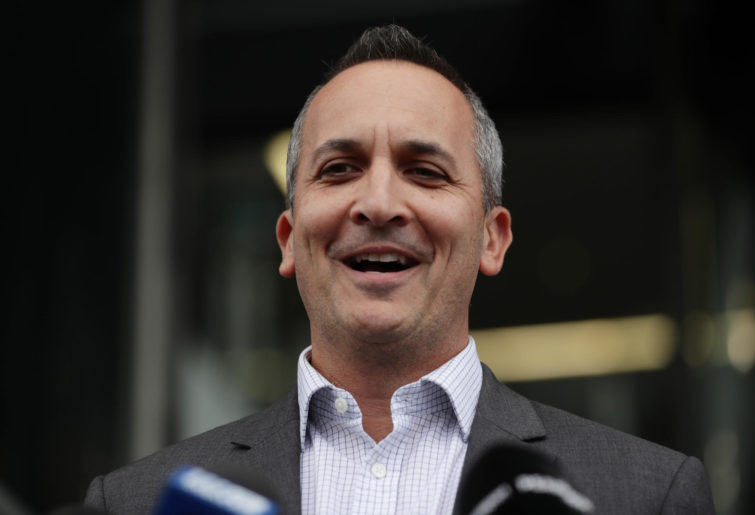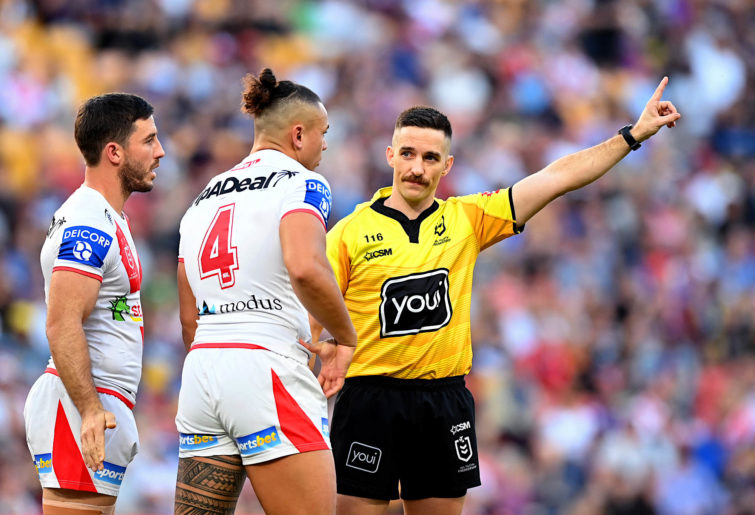Heyou
new author
Roar Rookie
Opinion
This article is in response to recent articles and discussions and the public comments of the NRL spokespeople and league commentators who have been so scathing of the so-called ‘whingers’.
Because everything is just fine and dandy with the NRL brand, a brand that is evolving daily into something that is becoming unrecognisable to all these ‘whingers’ who have played, coached, trained, mentored, refereed, donated time and money, purchased memberships, tickets, and everything and anything related to the game and its clubs.
They have loved and stood up for, sat in freezing cold, icy wind, snow and rain and 32-degree hot house stadiums and hills, sweat pouring down into the drinks and food purchased for themselves and their rugby league-supporting families.
They’ve very likely been supporters from the day their mums, dads, grandads and grandmas introduced them to the great game and the best teams ever in the whole wide sporting world.
The whingers spoken of – with a certain disdain and a bit of perceived disgust, even – are the whingers who have been keeping the grassroots of the game alive and in pretty good shape.
I’m not happy with anyone describing the backbone of rugby league in a derogatory and disdainful way. We are not the minority at all.
We are the majority.
We deserve to be heard and we have views, beliefs, feelings, emotional and tribal ties, and firmly held opinions about our game that are worth listening to.
We aren’t yobbos who can’t read or understand what is happening around this hugely important aspect of our collective lives.
The moral high ground taken by the NRL and those who are happy to toe the party line, a line that the majority don’t want to, and won’t toe, seem to believe that their might is right and anyone who disagrees with their beliefs and opinions… well, they just don’t matter.
We are told, in essence, to put up and shut up.

ARLC chairman Peter V’landys. (Photo by Matt King/Getty Images)
Perhaps it’s time to listen to what these people are feeling and thinking.
It’s being expressed in thousands upon thousands of posts, heated discussions around dinner tables, at work, by the water cooler, in cafes and restaurants, pubs and clubs, on the phone, in the streets and at the footy.
It’s not good. It’s not nice and it’s not happy smiling faces in the wake of the constant and continued re-working of the great game that was rugby league.
We are all for player safety and less injuries but the way this has been handled by the NRL is unhelpful and entirely useless in the long-term scheme of things. The situation is much more complex than head injuries and tackling techniques.
The ‘solution’ announced by the NRL on the eve of the ‘Magic’ Round, transforming it into the ‘Tragic’ Round, is typical of their band-aid fixes of late.
There are dangerous tackling techniques and strategies that have been outlawed for many years, or just a few years and for four days!
As each new and inevitably dangerous style is developed within certain clubs, they are eventually banned and so we know what should be consistently, objectively and equitably policed across all clubs and in all games by match officials.
The rule changes introduced by the NRL to speed up the game and make it more exciting for spectators have had other, much less desirable consequences, such as an injury toll unprecedented in this modern era.
The solution outlined by the NRL on the eve of the the Tragic Round will not be effective because it is virtually impossible to keep up the momentum of multiple sin-bins, send-offs and charges resulting in suspensions for any tackle involving the head and neck, along with the many outlawed tackling practises (the crusher, the chicken wing, the wrestle, head-high, neck-high, lift above the horizontal, leg workand the list goes on) and will go on as long as clubs and coaches find new ways to tackle and gain advantage in the ruck.

Josh McGuire of the Dragons (Photo by Cameron Spencer/Getty Images)
You know they will devise some new and secret tackle torture and that it will be banned at some later date.
Perhaps it’s time to take a look back at some of the acceptable tackling styles used by the great players of the past. Perhaps watch a few historical games to gain some insight.
I watched quite a few games from the past to explore the use of acceptable tackling practises. I found a few that are happily gone but I also found a few that could be taught to players from the under-6s to the elite levels of rugby league.
Some changes are good and sometimes it pays to look back in order to be forward thinking.
One could argue that the players and their clubs will knuckle down and learn to tackle from the upper chest down. But the issues are so much more complex than where a tackle lands in the first incidence.
Every tackle that involves any part of the head and neck is to be reported. The tackler can be summarily sin binned or sent off.
They will be charged and most likely suspended and their career may take a nosedive as the points start adding up based on the number of offences the player has been found guilty of and the suspensions start impacting their club, their team, the spectators, supporters, fans and themselves.

(Photo by Mark Metcalfe/Getty Images)
What must be considered?
When is a tackle completed? Is it completed when the player is down on the ground with three or four tacklers on top, while the first tackler on the bottom of the pile shoves a forearm across the neck of the player and pulls up on the neck and jaw?
Is it when the tackler on the bottom of the pile of three or four defenders proceeds to grind or smash the player’s face into the ground and hold it to the turf?
Is it completed when the referee calls, “Held!” and the defenders continue to drag the player along the turf with a forearm across the shoulder or neck? They can drag that player for many metres without being penalised even after the referee has called “held”?
If the tackle is completed once the referee has calls held, why are the actions of defenders allowed to continue unabated for a metre or three?
Is a tackle complete when a defender goes to correctly, by the rules, utilise a particular lawful, acceptable tackle technique and the attacking player then drops down into the tackle so that the defender has no time to change the direction or area the tackle ends up in ie around the head and neck?
Is a tackle illegal if the attacking player purposely turns as the defender’s tackle is set in motion, to ‘allow’ the defender to make contact with the head or the neck to purposely be award a penalty, sin-bin, on report and a tackle restart to boot?
I’ve only touched on a few of the complexities involved.
But perhaps it’s enough to make a point.
This is a serious matter that requires more than a band-aid. A “We are coming down hard on dangerous play!” yet again, as injuries to players increase exponentially, is not the long-term solution.
Obviously I’m no expert on these matters, but I have loved this game for more than 50 years and I’m not loving or even remotely liking the style of rugby league that is being developed by the national board of directors and all-round self-proclaimed experts.
Why must this game be continually ‘edited’ with new rules being added to the already overstuffed rule book? A book that is becoming so complex as to confuse even the smartest rugby league minds.
The match officials must be close to a nervous breakdown and I don’t wonder why officials are coming up with controversial adjudications.
The NRL is treating the spectators, the fans, the supporters, the clubs and not least the players, as if they are morons, by assuming that they will accept their decision to merely pay lip-service to their concerns and questions.
Ninety per cent of the games of this past round were horrible spectacles to so many.
Reading widely across social media groups and various other forums I’ve found that I’m so far from alone in these opinions.
There is so much anger, and sadness too, regarding the games we all were watching.
I kept watching and even un-muted the sound so I could see and hear all that was being done and said on the field by the official and players and also by the commentators.
I’ve been disenchanted with the NRL for quite some time.
Making myself watch the final game of the round, I was so disappointed to witness another unbelievably sad and frustrating spectacle of a game.

(Photo by Bradley Kanaris/Getty Images)
I don’t take away from the brilliance of the Panthers. However, it was another blow-out score with inconsistent and downright confusing adjudications.
What makes it harder to take is the many outlawed, banned actions not seen, or ignored, by match officials and then seen and ignored by the match review committee.
Is it any wonder that many are disheartened, disillusioned and disenchanted with the NRL and governing bodies?
Is it any wonder that clubs choose not to fight charges and accept early guilty pleas in return for a reduced sentence?
What are they afraid of? Who are they afraid of?
Tell me I’m an old fool. Tell me I don’t understand. Tell me I’m making a mountain out of a molehill. Or tell me you understand where I am coming from.
But please don’t tell me how to feel about the version of rugby league that is the result of this NRL board attempting to fix something that wasn’t really broken, merely requiring some streamlining of the rule book, a vast improvement in the consistency of adjudication, and the consistent, objective application of the rules in a fair and equitable manner across the league.
These same words keep coming up: consistency, objectivity, fairness, equity, equality.
We don’t require perfection. We are not ‘silly little dreamers’. We expect, and would happily accept, the next best thing.